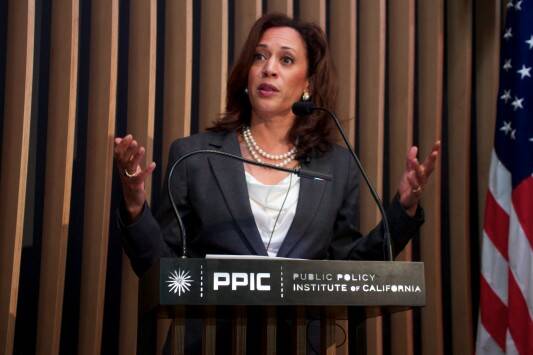The person who will probably get the third-highest number of votes in the entire U.S. in 2016 is running virtually unopposed.
That person is Kamala Harris, the California attorney general who is running to replace Barbara Boxer in the U.S. Senate. Harris is the heavy-as-a-Popeye’s-dinner favorite for the Democratic nomination, now that Lt. Gov. Gavin Newsom and former Los Angeles mayor Antonio Villaraigosa have declared they’re not running (presumably preferring to run for governor in 2018). And because the Republican Party is so weak in a state with almost entirely urban electorate, its most optimistic scenario is some self-financed candidate who will spend the millions to lose in November, rather than raise money that could otherwise go to winnable races.
BloombergView’s Francis Wilkinson marvels that in “the two biggest, most expensive” political races of 2016, the presidency and a Senate seat in our largest state, “Democrats thus far are offering candidates who appear to have no serious competition. Both are women. That’s new.” Referring both to Harris and to Hillary Clinton’s commanding position in the presidential race, Wilkinson writes, “It’s as if a glass ceiling is being removed before it can be shattered, sparing the mess.” (But in the case of Harris, the ceiling has been gone since 1992, when women won both of California’s Senate seats.)
Women are still underrepresented in Congress (they now hold only 20 of 100 seats), but this may not be the fault of voters. Last year, political scientists Kristin Kanthak and Jonathan Woon conducted an experiment to measure “election aversion” on the part of women. “Past research has shown that women seem to be under confident in their ability to hold office,” Woon wrote. In the experiment, members of a task group (charged with adding up numbers) were asked whether they were willing to serve as the group’s leader. About 80 percent of both men and women said yes. But when the leadership position became an elected office, requiring hopefuls to compete against each other with short speeches, 78 percent of men and only 60 percent of women were willing to run.
Perhaps women naturally shy away from competition, but they could have also carried some sociological baggage before they participated in the experiment. According to a report released last year by Political Parity, an organization working to increase the number of women in elected office, many women feel they face higher obstacles to a political career—and, no, they do not mean juggling work and family obligations. The Washington Post’s Jena McGregor writes, “women in the [Political Parity] studies focused attention on the fundraising demands for national or statewide office and the lack of support they received from political parties. While just under 50 percent of the respondents [in a survey of female candidates] said their parties encouraged male and female candidates equally, roughly 45 percent said they encouraged men more.”
McGregor writes that women are not necessarily shy about asking for money, but many candidates are “not being plugged into the right networks to make them successful when they try to raise funds.” She quotes Heidi Hartmann, president of the Institute for Women’s Policy Research: “You can learn to do the ‘ask.’ That’s not hard…. What's hard is [getting] the list.”
Since they have little competition for access to Democratic contributors, this probably isn’t a big problem for Hillary Clinton or Kamela Harris. Similarly, Michelle Nunn and Alison Lundergan Grimes faced only token opposition for Democratic U.S. Senate nominations last year in Georgia and Kentucky, so it’s unlikely they had trouble getting big donors on the phone. They lost in November, but Republican Joni Ernst in Iowa, a state senator who overtook a former energy-company CEO in the polls to get her party’s nomination, won comfortably. No one suspected her of election aversion, or aversion to conflict of any kind, after a commercial in which she said her experience castrating hogs would help her cut spending in Washington.
In the case of Kamala Harris, this is the wrong cure for the problem of big money controlling American politics. (Dianne Feinstein spent $12 million to keep her U.S. Senate seat in California against token opposition in 2012; Harris will surely spend more.) If women find it especially difficult to raise the ever-increasing minimum funding required to run for major office, eliminating competitive Democratic primaries is not the ideal solution.
A better approach would be to encourage and provide financial assistance to women who would make good candidates for state legislatures and local offices. “Getting the list” is crucial in elections where local business owners, as well as board members in both the private and nonprofit sectors, have considerable influence. Winning lower-level offices, in turn, is the best way for women to get on the farm team (castrating hogs not required) that produces candidates for statewide and national races.
The major political parties have to be aware of, and correct for, both the overt and subtle discouragement of women who want to participate in politics. This is a challenge for institutions of all kinds, including the Catholic Church (see America’s editorial on “A Space for Women”). Kamela Harris gliding to a U.S. Senate seat in a poor-turnout Democratic primary isn’t a terribly useful template.








